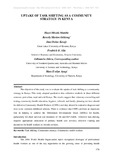| dc.contributor.author | Mumbo, Hazel Miseda | |
| dc.contributor.author | Ochieng’, Beverly M | |
| dc.contributor.author | Kaseje, Dan O | |
| dc.contributor.author | Aila, Fredrick O | |
| dc.contributor.author | Odera, Odhiambo | |
| dc.contributor.author | Ayugi, Mary E | |
| dc.date.accessioned | 2015-03-20T07:38:55Z | |
| dc.date.available | 2015-03-20T07:38:55Z | |
| dc.date.issued | 2013-05 | |
| dc.identifier.citation | Mumbo, H. M., Ochieng, B. M., Kaseje, D. O., Aila, F. O., Odera, O., & Ayugi, M. E. (2013). UPTAKE OF TASK SHIFTING AS A COMMUNITY STRATEGY IN KENYA. European Scientific Journal, 9(14). | en_US |
| dc.identifier.uri | http://eujournal.org/index.php/esj/article/view/1077/1111 | |
| dc.identifier.uri | http://hdl.handle.net/11295/81457 | |
| dc.description.abstract | The objective of the study was to evaluate the uptake of task shifting as a community strategy in Kenya. This study adopted qualitative data collection methods in three different contexts; peri-urban, rural and arid Kenya. The results suggest that voluntary counselling and testing, community health education, hygiene, referrals and family planning services should be shifted to Community Health Workers (CHWs) and they should be trained to diagnose and treat some common childhood ailment. There is evidence that CHWs perform an important role in helping to achieve the Millennium Development Goals (MDGs) for health, particularly for child survival and treatment of TB and HIV/AIDS. Effective task shifting requires appropriate utilization of primary health care services, effective training and incentives for health workers to provide services. | en_US |
| dc.language.iso | en | en_US |
| dc.publisher | University of Nairobi | en_US |
| dc.subject | Task shifting, Community strategy, Community health workers | en_US |
| dc.title | Uptake of task shifting as a community strategy in Kenya | en_US |
| dc.type | Article | en_US |
| dc.type.material | en | en_US |

